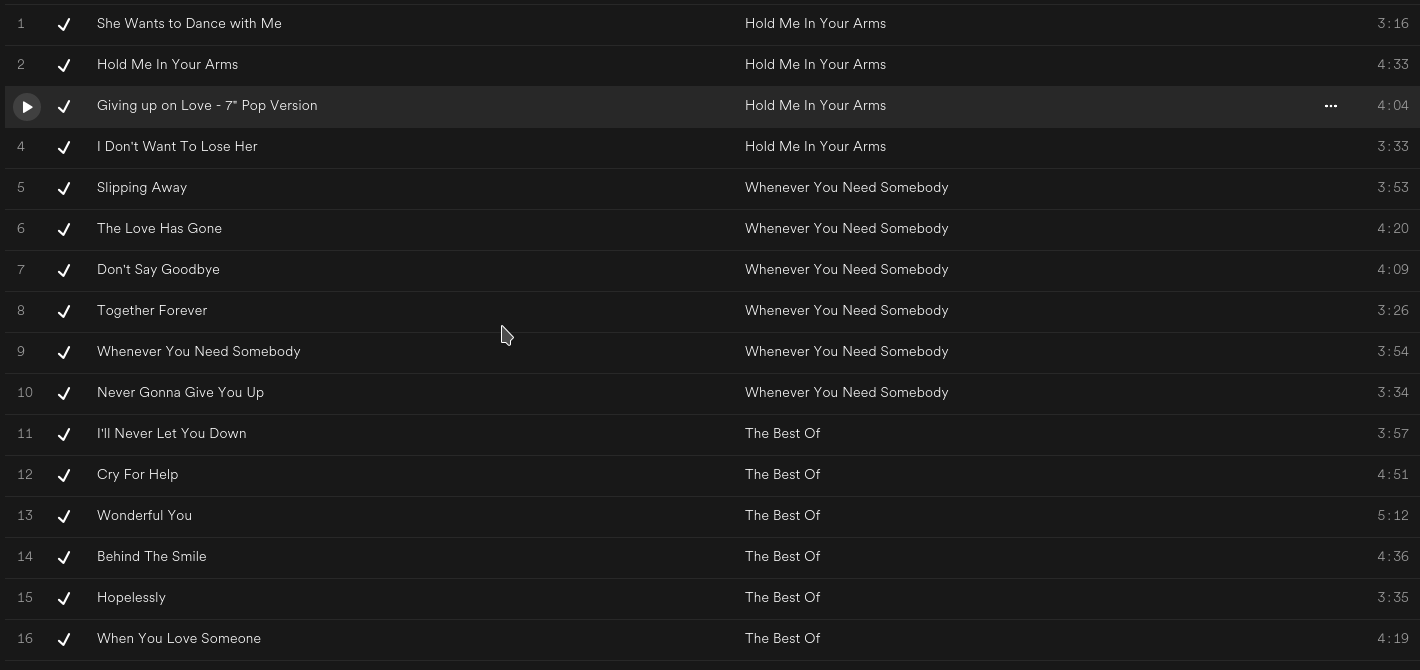How to rickroll people that try to run "rm -rf" on your system
I like Rick Astley late 80's songs, and you can see them here in my Spotify:

I like rickrolling people too, especially if they are trying to delete my
entire
/home directory or, even worse, /. Since I learned
how to use the alias built-in, I wanted a way to prevent that
random people tinkering with my laptop (that I may forget to lock) could
delete potentially important stuff, just for fun or boredom.
The method that I will show will lock any rm command runned in
both recursive and force mode, so rm -rf,
rm -f -r and rm -r --force are all blocked, even if
they are runned with sudo. I am going to alias the rm command in
/etc/profile, /etc/bash.bashrc and in
/etc/zsh/zshrc (I am a zsh user) so that the rickroll will be
possible from all users, even root and the ones with a brand new
.bashrc or .zshrc. Here is the code I appended to
those files:
alias rm=/bin/rmAlias
# this enables aliases in sudo, see http://askubuntu.com/q/22037/
alias sudo='sudo '
Since alias is not able to control the flags of the aliases (see
here, we are going to redirect each call of rm to
/bin/rmAlias, that would run the command if it is safe. I did not
use a function because it is a bit tricky to make that work with
sudo. So, let's see the code I put in rmAlias:
#!/bin/bash
# Rickroll whoever tries to desert this system, even root.
# To achieve this, set the appropriate aliases in /etc/profile and others.
# Video played when rickrolling: it's just Never Gonna Give You Up on my system,
# but be free to customize this!
ROLLVIDEO=/opt/anti-rm/serious-video.mkv
rickroll() {
echo "Never gonna desert this system..."
xdg-open $ROLLVIDEO 2>&1 & exit 0
}
while getopts ":rf-" opt; do
# Prevent '--force' to be detected as -r and -f
if [ "$opt" = "-" ]; then
OPTIND=$OPTIND+1
continue
fi
if [ "$opt" = "r" ] || [ "$opt" = "f" ]; then
if [ "$tmp" = "" ]; then
tmp=$opt
continue
elif [ "$tmp" != "$opt" ]; then
rickroll
fi
fi
done
for var in "$@" do
if [[ "$var" = "--force" && "$tmp" = "r" ]]; then
rickroll
fi
done
# If it's safe, just run rm
/bin/rm "$@"
exit $?
It may look messy to a UNIX guy more experienced than me, but it
works. The getopts built-in sees if both the -r and
the -f flags are used and, if so, it starts
rickroll(), which opens with xdg-open that amazing
clip from RickAstleyVEVO. From line 30 and below, the script checks
if the --force flag is used instead of -f.
Let's give execution permissions to the script we have just created:
chmod +x /bin/rmAlias
Restart your shell, and enjoy. If you want to test safely, I suggest trying to
run rm -rf with no folders or a nonexistant one, since this
script stops even these commands.
If you want even more security, you can rename this script to
/bin/rm and move the original one in some other place, getting
rid of all the aliases. I prefer the solution above because it's tidier: you
haven't to move anything. In fact, this could be just an AUR package...